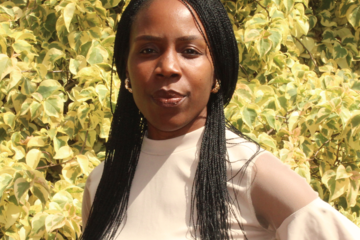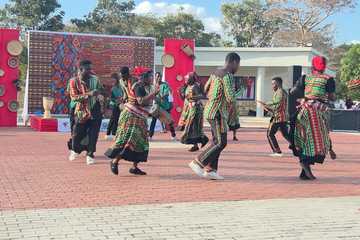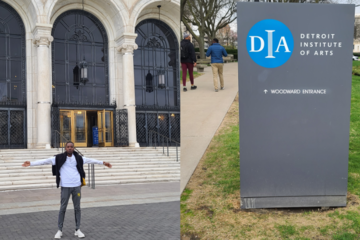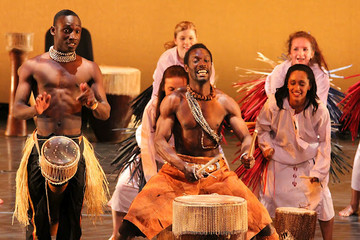Feed
-
ArticleCulture in collaboration: repurposing folklore for youth empowermentAfrica, particularly Nigeria, has a teeming young population who attempt to creatively navigate rapidly shifting identities within an unstable economy. For them, storytelling becomes a powerful tool through which sense is made of their place in the world. My research on folklore reimagination interrogates how traditional narratives are transformed into contemporary artistic endeavour that reflect the social realities of the youth. Folklore reimagination thus becomes an avenue for skill acquisition and empowerment in a society plagued with mismanaged resources and youth unemployment. By perceiving folklore as a living resource rather than a mere relic of the past, my research attempts to revive cultural heritage into digital content for the screen, constituting a source of self-employment for young creatives. In addition to addressing SDG number 8 – decent work and economic growth, this research fosters partnerships between culture and performance, youth and communities, tradition and modernity, and between local narratives and a global audience, offering education opportunities and reduced poverty. The research goal is to develop a toolkit which serves as both a learning and teaching aid for students and teachers of creative writing, further resonating with SDG number 4. Besides offering a platform for creativity and skills acquisition leading to self-employment, this research provides a model for a cultural engagement that is rooted in heritage preservation, shared creativity, collaboration and mutual respect. The research, which began in 2022, is divided into three distinct phases – toolkit draft, evaluation and update. Phase one involves the draft of the toolkit, which is divided into 5 parts and provides ethical insights and guidelines on working with folklore from the point of collection until reimagination. Offering mostly a theoretical guide, this phase is completed, and phase two is in progress. Phase two demands working closely with student writers to test the toolkit draft. Through a close collaboration with my students, aspects of the toolkit are currently being tested for effectiveness. Through feedback provided by the students, the toolkit will be updated with practical guides and sample scenarios. Further updates are expected following curated workshops, writers’ conference and creative labs. The creation of this toolkit resonates with the theme for this newsletter - art in partnership. Currently under the mentorship of Dr Jeff Wray of Michigan State University and Professor Chinenye Amonyeze of University of Nigeria, this research highlights that art, generally and folklore in particular, is not just a memory of set time in history, but a flexible material that can be reshaped into performances and creative narratives with social and economic value, while fostering partnerships driven by art. Folklore reimagination is, at its heart, an art of cultural partnership which depends on collaborations between researchers and creatives. By centring youths as creative agents, it leverages heritage to build skills, empowerment and self-employment. In this partnership, cultural memory is perceived and treated as a resource for innovation and economic growth. This art of partnership is therefore a sustainable one built on shared stories – stories that bear identities shaped by the past, present and future.By: Baboki Gaolaolwe-MajorThursday, Dec 11, 2025CULTURE AND SOCIETY+1

-
Article2025 AAP Consortium Delegates Welcomed in Classic Warm Heart of Africa StyleDelegates to the AAP Consortium Meeting in Malawi were welcomed with a vibrant cultural reception on the afternoon of Sunday, June 8, 2025, at the Bingu International Convention Centre (BICC) Amphitheatre. The event offered a rich immersion into Malawi’s cultural heritage, from traditional dances that transported participants across the country, to rhythmic music echoing tales of generations past, complemented by a curated selection of local foods and beverages. Set in the warmth of Malawian hospitality, the reception also featured interactive activities celebrating African cultural diversity through language games and cultural lightning talks. Reception Planning The reception was carefully designed to celebrate cultural identity and diversity while ensuring an enjoyable and memorable experience for all attendees. Preparations began with identifying local performance groups whose artistry authentically reflects the Malawian cultural brand. Consultations with selected groups ensured a thoughtful balance of energetic and soothing performances suited to a diverse audience, ultimately creating a programme that offered a cultural tour of Malawi through music and dance. Organisers also coordinated with the hosting hotel to incorporate Malawian cuisine on the cocktail menu, showcasing the country’s culinary heritage. With the performances and menu in place, the reception hosts curated additional interactive activities to promote cultural exchange and engagement among delegates. Performances The Malawi National Dance Ensemble, popularly known as the Kwacha Cultural Troupe, headlined the afternoon. Established in 1987, the renowned 30-member troupe delivered a captivating sequence of traditional dances representing Malawi’s regions. Their repertoire included Beni, Chimtali, Chisamba, Chiterera, Mjedza, Malipenga, Ingoma, Mganda, Vimbuza, and Gule Wamkulu—the iconic masked dance of the Chewa people. Adding to the ambiance, Owen Mbilizi and his team offered a rich musical experience featuring original compositions and Malawian classics, blending skilled instrumentation with harmonious vocals. Delegates responded with enthusiastic applause and cheers throughout the performances. Local Foods Participants enjoyed an assortment of local delicacies, including mandazi, zitumbuwa (banana fritters), malambe (baobab) juice, and thobwa (sweet beer), alongside familiar continental snacks. The refreshment break provided an informal space for delegates to mingle, exchange reflections, and deepen their appreciation of the cultural showcase. Significance The cultural reception successfully highlighted Malawi’s artistic and culinary traditions while fostering a shared appreciation for cultural diversity among delegates. It was an afternoon filled with warmth, laughter, and a strong sense of community, the perfect icebreaker for the week’s engagements.By: Baboki Gaolaolwe-MajorTuesday, Dec 9, 2025CULTURE AND SOCIETY+1

-
ArticleFrom Lens to Learning: Alex Mkwizu’s Transformative MSU JourneyWhen Ibn Battutah said, “Traveling—it leaves you speechless, then turns you into a storyteller,” in his famous volumes Travels of Ibn Battutah, little did I know how profoundly this wisdom would echo throughout my eight-day experience at Michigan State University (MSU), East Lansing. I had the honor of attending as the overall winner of the InVision Africa Photography Competition, curated and sponsored by the Alliance for African Partnerships. This MSU initiative champions collaboration with African universities in art, culture, language, and other fields. My time at MSU was eye-opening, filled with warm introductions to professors and artists. I met Professor Peter Glendinning from the Kresge Art Center, whose expertise in photography was inspiring; Professor Susan Wyche, who specializes in Human-Computer Interaction (HCI); and Mr Vadu Rodrigues, a Master of Fine Arts candidate, from whom I learned how his personal influences shaped his narrative and storytelling in photography. I also met many other colleagues, learning from their diverse experiences and creative processes. These key encounters with experts and practitioners across different artistic disciplines opened doors for me to continue exploring, collaborating, and discovering new opportunities as a multidisciplinary creative artist passionate about the intersection of data, technology, and human-centered storytelling. One of the most memorable encounters was with Professor Peter Glendinning and his body of work Attached to the Soil, a brilliant photographic project consisting of fifty portraits, oral history-based stories, and metaphoric representations of South African youth. He shared fascinating insights into his process, including an old, rare tool he once used to achieve a stroboscopic effect before the era of advanced cameras and editing software. What stood out most to me was that each photograph’s story was told from the perspective of the subject themselves, a powerful approach to narrative photography. Another remarkable interaction was with Mr. Vadu Rodrigues and his artistic initiative Positive Africa, which seeks to challenge negative and biased narratives about Africa through photography and other art forms. Spending time with him in his studio was deeply insightful. I admired his practice of carrying a small notebook to document daily experiences and visual ideas that later influence his creative work. Observing his process from conceptualization to a finished art piece was a masterclass in intentional storytelling. The culmination of this experience profoundly influenced my growth as a creative technologist and multidisciplinary artist. It also opened new doors for collaboration, one of which came through the MSU Museum CoLab Studio. I learned about a call for artists to create a piece exploring AI singularity in all its forms. Having subscribed to the studio’s newsletter, I received the announcement and decided to apply with a concept for a Virtual Reality immersive experience: a VR tribunal where sentient AIs bring cases against humans. Participants take the role of the defendant, while a generative AI judge, UbuntuBot, presides, modelled on African communal justice systems. The project merges storytelling, ethics, and digital futures. As the old proverb goes, “Luck is when opportunity meets preparedness.” Fortunately, I was selected as one of the artists to collaborate with the MSU CoLab Studio, supported by a seed grant to bring this piece to life and exhibit it at the MSU Museum. While the journey has only just begun with MSU Art Community, the experience with the Invision Africa Photography Competition and the exposure and connections made within MSU’s artistic community have left a lasting and transformative impact. It will continue to shape my creative path and remain a defining part of my artistic journey.By: Baboki Gaolaolwe-MajorTuesday, Dec 9, 2025CULTURE AND SOCIETY+1

-
ArticleCelebrating The Role of Art and Creativity in Shaping Global PartnershipsPhoto by: Cris Dopher. The arts represent the most imaginative and creative form of expression, integral to the civilizational progress of communities worldwide. In Uganda, an East African country where I originate, the arts are embodied and lived through music, dance, theatre, poetry, storytelling, folktales, and other forms of artistic engagement. The cultural, historical, social, and political meanings are etched in the art forms of the people. The arts are evolutionary and revolutionary, depicting the changes and continuities, and instigating shifts in the lived experiences of communities. The arts have demonstrated their value in fostering community transformation across histories and territories. In Africa, the role of the arts has evolved in tandem with sociocultural, political, and economic changes in communities. The arts have offered platforms to sensitize communities around ever-emerging challenges, such as disease, climate change, conflicts, forced migration, gender-based violence, poverty, and cultural differences, among others. The functions of the arts have transcended stage performances and entertainment. Communities have deployed their creative and artistic potential to explore local solutions to prevailing problems. Within international development discourse on Africa, there is talk about ‘Africa finding local solutions to African problems’. Arts-oriented interventions that communities have applied and sustained offer a rubric on how communities in Africa can develop and implement sustainable and cost-effective solutions to local challenges. The migratory and borderless natures of the creative arts, and their distinctiveness as a universal language, position them strategically to mediate differences, heal broken communities, quell tensions, and pluralize perspectives. The transnational and transcultural nature of the creative arts is evident in how they are constituted by cross-pollination of diverse cultural traditions, stories, and orthodoxies. The art forms are reinvented and reimagined at the intersection of other existing artistic practices. The aspect of embodiment that gives the arts their true meaning and essence centers people, as bearers of practices, meanings, and knowledge. The global flow of art forms stems from local innovations. The being of the global dimension of the creative arts is rooted in their local value. Art proliferates by diffusion. The notion of art being born of people’s imaginaries enables its adaptation, assimilation, transcendence, and permeation across localities and contexts. Across Africa, the Black Diaspora, and global indigeneity, the commonalities between the arts demonstrate their universal reach, underscoring histories of migration, cultural connections, and intercultural interfaces. Scholarship, practice, and research are media through which the arts have found expressions in transboundary contexts. In the realm of scholarship, collaborative research in the creative arts has increased, generating rich and diverse knowledge that has improved the human condition. The mobility of scholars and researchers between cultures and nationalities has augmented the exchange of expertise and circulation of artistic and cultural ideas and practices. My current tenure as an African Futures Fellow at Michigan State University under the auspices of the Alliance for African Fellowship (AAP) is testimony to how the creative arts and artists can support global partnerships through scholarship and research. As a dance studies scholar at Makerere University in Uganda, East Africa, the program has supported me to connect with scholars at MSU and the US; co-write articles for publications; present at conferences; collaborate on artistic works with communities; and partner with researchers on ideation, incubation, writing, and submission of research grant ideas. Such engagements have facilitated the convergence of ideas, cultures, and people. My story represents a myriad of scholars who are leveraging the scholarly prowess of the creative arts to dissolve boundaries and dismantle barriers. The arts have accelerated global partnerships through joint performances and collaborative creative processes. Worldwide, concerts, festivals, competitions, showcases, and productions have facilitated exchanges between artists, communities, artistic works, and audiences, and have supported the mobilization of resources through fundraising to care for those in need. The arts have been the heartbeat of globalization. Through exposure to different artistic forms, communities have peeked into cultures beyond their own. The creative arts carry a unique ability to communicate across generations, demographics, cultures, and geographies. Communities across the globe have united through the creative arts to draw attention to and amplify the voices of the oppressed. The emergence of innovative technologies and platforms has empowered creatives worldwide to access wider audiences and listenership. Technology has democratized access and consumption of creative artworks globally. For Africa, the innovative platforms have enabled people to tell their own stories and confront stereotypical views through artistic and cultural products. Global business collaborations have emerged, resulting from the potential for the creative arts to circulate as commercially valuable products. The creative arts possess inherent power to unite people across divides. As the world confronts challenges of conflicts, climate change, food insecurity, natural disasters, disease, social injustices, forced labour, and human trafficking, among others, the arts will continue to take center stage as strategic tools through which global communities can partner to find solutions to these problems. The creative arts have always been the heart that gives and receives.By: Baboki Gaolaolwe-MajorThursday, Dec 11, 2025CULTURE AND SOCIETY

-
OpportunityCall for Papers: History of Technology Conference“Engaging the History of Technology” International Congress of History of Science and Technology Annual Meeting Democritus University of Thrace Alexandroupolis, Greece October 8 – 11, 2026 The theme of this conference, “Engaging the History of Technology”, invites critical reflections on how history of technology can engage with evolving methodologies, theories and pedagogies, and other branches of historical study to demonstrate that understanding technologies’ pasts are essential to navigating contemporary challenges. The conference, therefore, seeks contributions across spatial and epistemic boundaries: from the everyday and local to the geopolitical and planetary; from archival practice to classroom teaching and public engagement; and from discipline-specific research methods to interdisciplinary collaborations. Contributors may engage with one or more of the following themes, or even suggest new ways of thinking about: 1. The History of Technology between the Local, the Regional, and the Global:• Circulation of technologies, expertise, and knowledge across borders• Adaptation and appropriation of technologies in different cultural contexts• Tensions between globalisation and localisation in technological change• Regional networks and their role in shaping technological trajectories• Colonial, postcolonial and decolonial dimensions of technology• Networks of maintenance and repair2. History of Technology, Historiography and Education:• Methodological innovations in researching the history of technology• Interdisciplinary approaches and their challenges• Teaching the history of technology in universities and schools• Public engagement and the communication of technological history• The relevance of technology history to contemporary policy debates• Digital humanities and new forms of historical scholarship3. Intersections between the History of Technology and Other Fields of Historical Study:• Technology and social history: class, labour, gender, and everyday life• Technology and cultural history: representation, identity, and meaning• Technology and environmental history: sustainability, resource use, and ecological change• Technology and economic history: innovation, industrialisation, and development• Technology and political history: governance, regulation, and power• Technology and the history of medicine: cultural values, therapeutic practice, and material conceptions about the human body4. Special Focus: Museums, Material and Intangible Cultural Heritage, and Public Engagement: Given our collaboration with the Ethnological Museum of Thrace, the planners particularly welcome proposals that engage with material and intangible culture, museum practices, and public history. They are interested in innovative session formats that:• Explore tensions and synergies between academic and museum approaches to technological history• Demonstrate object-based learning methodologies• Address the challenges of communicating technological history to diverse publics• Examine the role of museums in preserving and interpreting technological heritage• Study visitor engagements with intangible heritage, particularly those of marginalised and silenced ethno-cultural communities• Critically examine the funding relationships between private technological and industrial interests, and museum Proposals will be accepted in the following formats: Paper presentations Individual and author teams’ presentations.Please, submit an abstract of up to 350 words. Panel Sessions Thematically coherent sessions of 3-4 papers. Panel organisers should submit a panel abstract (up to 400 words) describing the theme and its significance; after approval the conference committee and the panel organisers will issue a specific call for proposals (individual or author teams’ paper abstracts up to 350 words each). Roundtables Discussion-based sessions with 4-6 participants addressing a specific question or debate. Organisers should submit a description of the topic and format (up to 350 words); names and brief bios of participants (up to 100 words each); key questions to be addressed. Graduate Student and Early Career Opportunities ICOHTEC is committed to supporting emerging scholars. We particularly welcome submissions from graduate students and early career researchers. The conference will feature:• Visual Lightning Talk Competitions for graduate students• Mentorship opportunities pairing students with established scholars• Book development workshops Submissions of abstracts through the conference website: December 15, 2025 - January 31, 2026 Official conferencewebsite: https://icohtec2026.hs.duth.gr - Peter Alegi, MSU Department of History -“Soccer as Work and Play: A Congolese Life Story, from Colonialism to Globalization” (co-sponsored by the MSU Department of African American and African Studies and the MSU African Studies Center) Monday, March 23 - Jenelle Thelen – “Smooth as Silk: Working Women of the Belding, MI Silk Mills (1902-1908)” (co-sponsored by the MSU Center for Gender in Global Context) Friday, April 3 - David Stowe, MSU Religious Studies – “The Musical Tanner: Negotiating Work, Music, and Belief in Revolutionary Boston” * TBD - Nicholas Sly, MSU Department of History - “Curing the Crisis of Masculinity: Calisthenics and Office Work in the Early Twentieth Century” Check out all the Our Daily Work/Our Daily Lives brown bag presentation recordings available on the MSU Library website (over 125 and still counting!!- JPB) Did you miss a brown bag presentation that you really want to hear? Or perhaps you may want to explore the listing of past presentations that you didn't even know about. There's an answer to both quests. Thanks to all our friends at MSU Vincent Voice Library, there is a new home for all our recorded brown bags. Follow these links and you should be able to tap into all of the recordings we have cataloged thus far: Our Daily Work/Our Daily Lives Channel or https://mediaspace.msu.edu/channel/channelid/209060293. Easy Peasy!! Thanks to everyone for setting us up this way!!! The deepest note of Thanks to all of the folks at the Vincent Voice Library who have worked with us to create this archived set of recordings. Thanks to Shawn, James, Mike, Rick and the late John Shaw for their work over the years on our behalf. For over thirty years, "Our Daily Work/ Our Daily Lives" has been a cooperative project of the Michigan Traditional Arts Program and the Labor Education Program.By: Aaron DornerThursday, Dec 4, 2025CULTURE AND SOCIETY+1
 No Preview Available
No Preview Available -
ArticleCall for Book Proposals: Yorùbá Worlds, New Book Series Edited by Toyin FalolaThe University of Wisconsin Press is pleased to announce the launch of a new book series, Yorùbá Worlds, edited by Toyin Falola. Publishing innovative book-length works and privileging Yorùbá voices, this multidisciplinary series is intended to answer urgent calls to decentralize colonial narratives of Africa and its diaspora and elevate Indigenous knowledge systems, oral histories, and community-centered approaches. “The long and diverse history of the Yorùbá people, from precolonial times to today, included notable achievements in political systems, economic ties, cultural innovations, multireligious interactions, and global continuities,” says series editor Toyin Falola. “This series highlights Yorùbá voices and knowledge systems, focusing on agency and communities in both Africa and the diaspora, to deepen understanding of ongoing developments and potential related to identity, spirituality, decolonization, and transnationalism. I am excited about the opportunity to showcase and curate a wide range of innovative, cutting-edge, and multidisciplinary scholarship that offers new insights into the history, cultures, and intellectual contributions of what is perhaps Africa’s most significant and most widely dispersed group, the Yorùbá.” The Yorùbá people have a long history of producing remarkable cultural forms, intellectual traditions, and influential historical narratives. The history of Yorùbá civilization is exemplified by precolonial urbanized city-states such as Ilé-Ifẹ̀, Ọ̀yọ́, and Ibadan, each of which had administrative structures in place. As Yorùbá people dispersed globally, their religious beliefs, languages, and cultures were foundational to forming Afro-diasporic identity in Brazil, Cuba, Trinidad, Haiti, and the United States. Yorùbá legacy, both within the African continent and among members of the global diaspora, has intensified in the contemporary period, as seen in the vibrancy of the religious expressions of Santeria and Candomblé, the explosion of Afrobeats, Yorùbá films, and transnational repatriation projects, among others. Yorùbá Worlds is a multidisciplinary series that aims to showcase this vibrant legacy by compiling various perspectives. In addition to rigorous analyses of Yorùbá contributions to global intellectual, political, and cultural histories, the series will collapse some distance between academic inquiry and the wider world. The series will also be essential for understanding how African epistemologies continue to shape contemporary conversations about identity, spirituality, decolonization, and transnationalism. Editor in chief Dan Crissman notes, “The University of Wisconsin Press is a recognized leader in publishing groundbreaking and essential work in African studies. We are very pleased to partner with Dr. Falola to shine a spotlight on Yorùbá history and culture.” Series editor Toyin Falola is Distinguished Teaching Professor and Jacob and Frances Sanger Mossiker Chair in the Humanities at the University of Texas at Austin. Falola is the author or editor of more than 150 books on African history, politics, and society. He is the recipient of twenty-eight honorary doctorates from around the world as well as more than forty lifetime achievement awards. The series advisory board includes Olufunke Adeboye (University of Lagos), Akintunde Akinyemi (University of Florida at Gainesville), Andrew Apter (University of California, Los Angeles), Matt D. Childs (University of South Carolina),Henry Lovejoy (University of Colorado Boulder), Akin Ogundiran (Northwestern University), Bola Sotunsa (Babcock University), Aribidesi Usman (Arizona State University), Olufemi Vaughan (Amherst College), and John Thabiti Willis(Grinnell College). The first book in the series, Joseph Odùmósù’s Book of Healing, edited and translated by Michael Ọládẹ̀jọ Afọláyan and Helen Tilley, will be published in January 2026. For more information about submissions, please contact Dan Crissman, editor in chief, at dcrissman@wisc.edu. For other inquiries, please contact the series editor, Toyin Falola, at toyinfalola@austin.utexas.edu. About the University of Wisconsin Press The University of Wisconsin Press is a not-for-profit publisher of books and journals. With more than 1,500 titles and 8,000 peer-reviewed articles in print, its mission embodies the Wisconsin Idea by publishing work of distinction that serves the people of Wisconsin and the world. Contact Information Dan Crissman, Editor in Chief, University of Wisconsin Press Contact Email dcrissman@wisc.eduBy: Aaron DornerFriday, Nov 21, 2025CULTURE AND SOCIETY
No Preview Available -
PostAm glad to be hereBy: Hassan WilliamFriday, Nov 21, 2025YOUTH EMPOWERMENT

Leave a comment